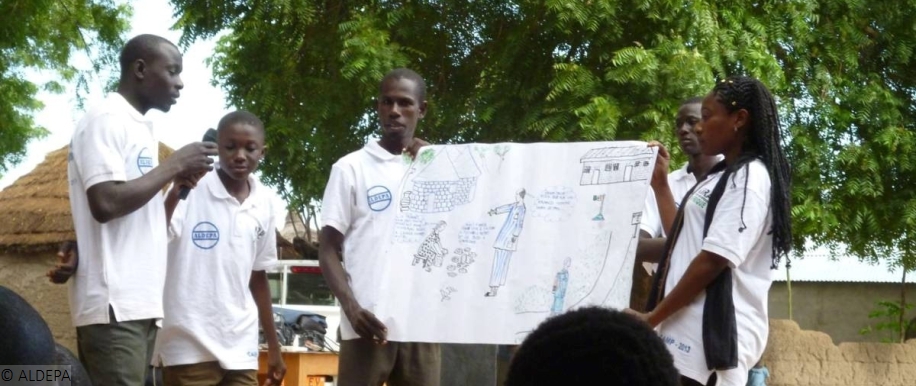Our Approach for Projects in Africa
Our Axes of Intervention
We insist on promoting exchange and cooperation between state and civil society for action which is reciprocal, responsible and sustainable. It is thereby crucial to include everyone involved.
To this end, our projects intervene on these axes:
- Supporting the State (via governmental structures) to guarantee children’s rights
- Strengthening the civil society (via local associations, groups, networks, media and individuals) as an advocate and promoter of children’s rights
- Supporting individual children in critical situations and enabling them to stand up for their rights
- Providing advocacy (via networks) on the national and international level
In this manner, children and young people take part actively according to their age and maturity.
Who we support
- Children without stable family relations (“street children”)
- Children in exploitative and hazardous working conditions,
i. e. domestic servants, field workers
- Children caught up in child trafficking and organized crime
- Children who have experienced sexual abuse and violence,
including child prostitution, early and forced marriage
- Children accused of witchcraft, who have been neglected, excluded, tortured and severely ill-treated
- Children in conflict with the law, including those detained in police custody or in jail,
- Children in armed conflicts
- Children who lack access to basic education (including early education for infants) or professional training
We are active for children whose situation is not at the center of international media coverage.
Our involvement is based on
- The United Nations Convention on the Rights of the Child (CRC)
- The African Charter for the Rights and Welfare of the Child (ACRWC)
The United Nations Convention on the Rights of the Child was passed on November 20th 1989 and ratified by all states except the U.S. and
Somalia. It is the first worldwide, cross-national treaty which deals solely with child protection. The focus is on the child as a person with fundamental rights who needs protection and is not just
an ‘object’ of help. This approach has changed the perception and status of children and has led to new, rights-based action for the protection of children and adolescents.
The African Charter for the Rights and Welfare of the Child additionally considers regional, cultural and social aspects particular to Africa. This charter was agreed on by
the Conference of the Heads of State and Government on July 11th 1990. It came into effect in November 1999 and has been ratified by 45 African states since. It grants children the same rights as the
CRC but at the same time highlights their duties in society.
Despite much progress, the rights established in the CRC and the ACRWC are only respected to an unsatisfactory degree in most countries, particularly in Africa. Often, there is a lack of proficiency
and resources to implement these basic human rights.
Basic Guidelines
- All projects supported by KiRA contribute towards promoting rights for children and young people in their individual living environment; cultural and religious values are respected as long as these do not breach the general rights of people and children.
- KiRA demands that projects serve as models. This means they must be adapted to the local culture, be carried out by the population and have adequate funding to put them into practice. We also want both our partner organisations and the population to have the openness, curiosity and courage to get involved in innovative measures.
- In accordance with our basic understanding of the responsibility of the individual for their own actions, campaigns should grow from our own initiative; only then can they be sustainable. To this effect, one of our basic principles is, that project ideas and the engagement for implementing rights for children and young people derive from our African partner organisations.
- Nevertheless, we are proactive ourselves: When learning about less known violations of children’s rights, we start appropriate research and initiatives, as well as look for partners or alliances to fight these incidents.
- All projects promote autonomy of our project partners as well as the target groups, e. g. children and their families. This enables them to put forward their own requests and access their rights. Hence, by empowering our target groups, their rights are promoted.
- This is particularly relevant for children and young people who would like to engage in asserting their own specific needs. Their requests should be considered, supported and promoted (participation of children and adolescents).
- Girls and young women require particular consideration since they are more often prone to violence, discrimination and social exclusion in our project areas. They are thus supported to respond to their specific interests and incorporate these into projects.
- We promote the collaboration with other national and international organisations, as well as work within networks, as long as they are concerned with shaping an environment which protects children’s rights.
- The cooperation with local implementing partnerns requires intensive exchange, openness and clarity in administration, finance and personnel management.
- With regard to our shared responsibility, KiRA expects adequate financial, material and personal participation from the partners and target groups.
- KiRA finances projects using its own resources (donations), and engages in raising funds from German and international funding partners.
- The structure of the partner organisation should be straightforward and the administration should be clear. Major decisions should be made democratically obtaining and considering the opinion of all parties involved.
- The staff adminisatration of the organisation is open to age and gender, nationality, ethnicity and religion. It rejects discrimination and is based on the laws and regulations in force in the particular country.
- KiRA’s code of conduct with regard to corruption and sexual abuse within the organisation is also adhered by our partner organisations and signed by all staff members.
Picture above: children and youth become active to restaure peace in their communities in the Far North region of Cameroon. © ALDEPA




